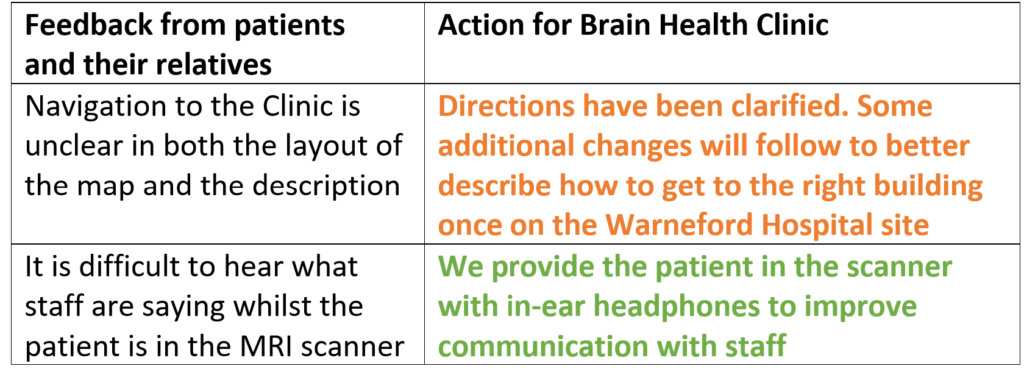The Oxford Brain Heath Clinic is a new integrated research and clinical environment. It is dedicated to preparing clinical services for the 21st century to preserve brain health. The clinic was launched in August 2020, as a pilot, to improve the assessment and diagnosis of memory problems. At the clinic, patients are given high-quality assessments not usually available in routine NHS care and are also offered the opportunity to take part in related research.
The Oxford Brain Health Clinic is located at the Warneford Hospital in Oxford as part of the Oxford Health Biomedical Research Centre (OH BRC) and is jointly led by Professor Clare Mackay (BRC Theme Lead) and Dr Lola Martos (Clinical Lead).
Oxford Brain Health Clinic services
Patients who are referred by their GP to pilot-partner memory clinics are first triaged to the Oxford Brain Health Clinic for an advanced brain health assessment. At a later date, patients attend their memory clinic appointment where they receive the results of their brain health assessment.
The advanced brain health assessment provides a more detailed clinical report to assist the doctor in making more confident and accurate diagnoses. The assessment consists of:
- an MRI scan instead of a CT scan, providing clinicians with more detailed information about brain pathology
- an additional neuropsychological assessment, supplementing the brief cognitive assessment completed at the memory clinic
- clinical questionnaires covering depression, sleep, activity, alcohol use and long-term conditions
- an interview with the person accompanying the patient, including questions about changes in the patient’s cognition, behaviour and general function
Oxford Brain Health Clinic research
Everyone who attends the Oxford Brain Health Clinic is also given the opportunity to take part in research to help improve the diagnosis and treatments available for people with memory problems.
Patients can take part in research by consenting to any of the following:
- the storage of their anonymised clinical data on the Oxford Brain Health Clinic’s research database. This data will help us learn about how to predict future patient diagnoses
- being recontacted about future research studies into cognitive problems and dementia. In so doing, patients can assist researchers in undertaking cutting-edge research
- additional tests on the day of assessment such as:
- a saliva sample to provide genetic information related to memory problems
- extra time in the MRI scanner to collect additional brain information that, with further research, may provide sensitive clinical information to help diagnosis
- questionnaires related to brain health
- cognitive tests of memory, attention and thinking skills
The person accompanying the patient to their appointment can also choose to take part in research.
Progress of the Oxford Brain Health Clinic
Since its launch – and despite the challenges of the COVID pandemic – the clinic has completed over 100 patient assessments. Thanks to the majority of our patients who have agreed to take part in research, we have successfully integrated advanced research assessments into this clinical setting. We have also provided a streamlined service to patients and clinicians by integrating with NHS systems.
How previous attendees have chosen to take part in research
The feedback from patients and their relatives has been extremely positive. Clinic attendees have reported feeling comfortable with the experience, being well-informed and being well looked after by friendly staff. 98% of patients were satisfied with the pre-appointment information and process. After the appointment, 100% agreed that the assessment process had been clearly explained and that they were satisfied with the service they received. 97% agreed that they were well informed about next steps and given the opportunity to ask questions which were answered adequately.
You said, we did!
The feedback from patients and their relatives is vital for helping us improve the experience of future visitors. The table highlights the feedback we have been given and how we are responding. Actions in orange text are work-in-progess whilst those in green text have been completed.

Clinicians have also given positive feedback about their experience of working with the Oxford Brain Health Clinic. They reported clearer diagnostic inputs resulting in a reduced follow-up appointment time for patients, from 75 minutes to 45 minutes. Read more about their feedback here.
Future of the Oxford Brain Health Clinic
Future plans will follow the evaluation of the Oxford Brain Health Clinic pilot and funding decisions. However our ambition is to get better at measuring brain health and at recognising risk factors earlier. In so doing, we can help researchers identify the most promising treatment targets and match people with the right interventions for them, be they future pharmacological or lifestyle prescriptions.
It is only by integrating this research with clinical practice that we can reach large patient populations to hasten progress and ensure findings are relevant to everyone. Therefore our intention is that the next phase of the Oxford Brain Health Clinic will see the expansion of its clinical services within Oxford and the Thames Valley and subsequently to other parts of the UK.
Expansion of brain health clinics across the UK
The Oxford Brain Health clinic is one of a rapidly growing number of clinics, all playing their part in improving outcomes for people at risk, or with early signs, of dementia. At Oxford, we have been working with Alzheimer’s Research UK to explore how we engage effectively with policymakers to support the expansion of the clinics. Dr Isolde Radford, Policy Manager at Alzheimer’s Research UK, recently visited the Oxford Brain Health Clinic to see for herself what we do. Here she describes the experience and the potential of such clinics to improve our ability to prevent and treat the diseases that cause dementia.
For further information regarding our research please visit our webpage on University of Oxford Department of Psychiatry web site: Oxford Brain Health Clinic — Department of Psychiatry



